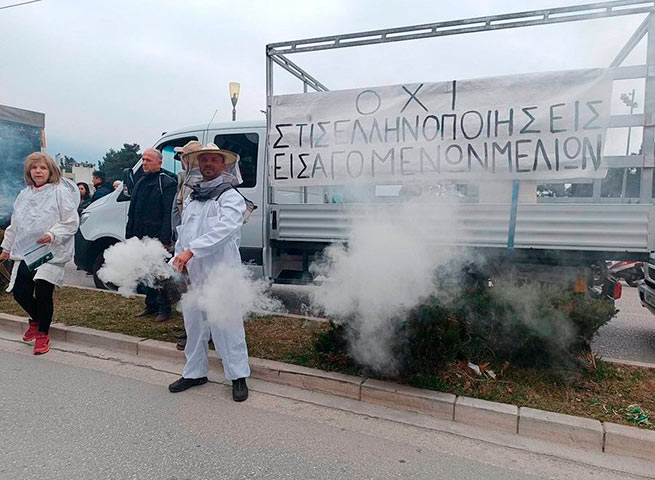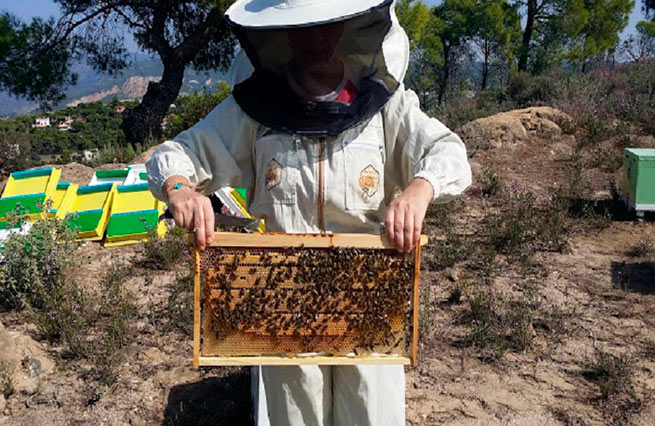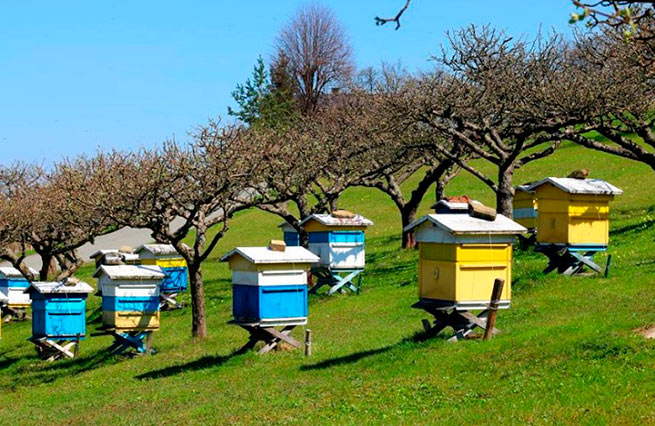Beekeepers from across Greece flocked to Athens on Thursday to protest, demanding solutions to serious problems facing their sector. Among them are unfair competition from imported honey labeled as “Greek”, a ban on visiting forests or fumigating hives at certain times, and high production costs.
Dressed in riot gear and holding smokers, some in trucks and others on foot, the beekeepers arrived shortly after 9 a.m. at Syntagma Square, opposite the Greek parliament in central Athens. They are asking the government to resolve their demands as beekeeping is in danger of extinction, they complain, especially after the new law passed last summer.

Meetings are scheduled for today with the Ministry of Rural Development and the Ministry of Transport to outline the demands. In particular, beekeepers are demanding administrative measures to track imported honey, exemption from taxes on fuel, the removal of restrictive fire regulations, the removal of local restrictions on forestry, subsidies for pollination, full inclusion in CAP and landscaping, reform of the agricultural insurance organization ELGA, full compensation for lost bees, allowing beekeeping trucks to drive on roadsides.
“Our requests are to allow us to work in the forests, to stop these rules prohibiting smoking after 11. This is very unfair. We cannot work without a smoking room,” said Georgiadis, vice-president of the Thessaloniki Beekeeping Association.

Giorgos Sentementes, president of the Association of Professional Beekeepers of Messinia, Laconia and Arcadia, told state broadcaster ERT that producers want the government to put an end to unfair competition caused by imported honey being sold as “Greek” honey at extremely low prices.
Earlier on Thursday, tensions arose between protesters and police when the latter blocked about 30 of their colleagues’ trucks on Kavala Avenue, despite the fact that a permit had been issued to them by the ministry.
Beekeeping in Greece

With superior quality, special properties and rich taste as allies, the world famous Greek honey strives to take its rightful place. It has a special place in the Mediterranean diet and has gained international recognition due to its special quality characteristics, which have been facilitated by the development of beekeeping conditions and the rich and high-quality beekeeping flora of Greece.
However, an important factor constraining the growth of Greek exports is their high price, due to high production costs. In order for Greek honey to become more popular and take its rightful place in the international market, deep cuts and corrective movements are necessary, associated with the expansion of production, the creation of a Greek PDO, the appearance of the name of origin.
Beekeeping in numbers
According to the Ministry of Environment and Physical Planning, Greece has 10.8% of beehives EUwith 73% of them owned by professional beekeepers (keeping at least 150 hives).
At the same time, according to Eurostat, Greek honey production is 1% of the world and 7.4% of the European (fourth place) with 16,000 tons. Beekeeping in the EU is constantly growing, both in the total number of beekeepers and professional beekeepers and in the total number of hives, as it is considered profitable.

However, according to the latest census of the Hellenic Statistical AuthorityELSTAT) with data for 2020, the number of beekeeping farms is decreasing, and the number of hives is increasing slightly. Specifically, in 2009 the number of beekeeping farms was 10,551, and in 2020 8,704, a decrease of 17.5%, while the corresponding number of hives was 944,014 in 2009, and in 2020 952,963, an increase of 0. 9%.
Export in 2021
However, Greece has been a predominantly beekeeping country since ancient times, with Kavala, Chalkidiki, Evia, Peloponnese, Crete and the Aegean islands considered the main beekeeping areas.
In Greece, 90% of honey is collected from wild ecosystems rather than from monocultures (as is the case with honey from other countries), and there are virtually no genetically modified plant crops in the country.
2/3 of the honey produced in Greece is tree honey (pine – 55-60%, fir – 5-10%) and 1/3 is flower honey (thyme – 10%, orange – 10%). According to the latest available data, more than 6.3 million honey was exported from Greece to international markets in 2021, with a value of €25.8 million and an average price of €4.07 per kilogram, according to Eurostat.
The champion in the import of Greek honey is Italy: the neighboring country imported 1,441,659 kg of Greek honey worth a total of 3,796,335 euros. Next comes Germany with 1,305,679 kg of honey worth 5,734,964 euros and France with 420,214 kg worth 2 013,528 euros.

Import…
Europe is approximately 60% self-sufficient in honey. According to FAO, European production decreased by 16% between 2015 and 2020 (from 257,000 to 218,000 tons), while the number of hives increased by 16% (from 17,189,000 to 20,046,000 in 2016-2021 years).
In particular, the EU produces a total of about 250,000 tons of honey each year, while the corresponding amount sold within the EU is about 450,000 tons. This means that all EU countries provide themselves with honey less than 60%. The missing 200,000 tonnes of honey are imported annually from non-EU countries.
In 2021, according to Eurostat data, the European market imported more honey than countries outside the EU, Ukraine and China. Compared to 2016, honey imports from non-EU countries increased by 7%, while EU honey exports to non-EU countries decreased by 10%.
Falsification
According to the European Commission, honey is the sixth food product that is susceptible to adulteration or fraud. Honey adulteration is economic fraud and misleading the consumer, since the distorted product does not have the beneficial properties of real honey. The most common methods are to falsely indicate botanical origin (eg, calling thyme a flower) or geographical origin (labeling imported honey as Greek), and the most common fraud is the addition of exogenous sugars (eg, isoglucose).







More Stories
Türkiye thanks Mitsotakis government for leaving Greek sovereignty zone
Greece signs F-35 deal with US
Tension between Greek and Turkish warships south of Kasos